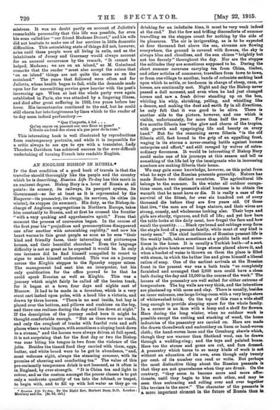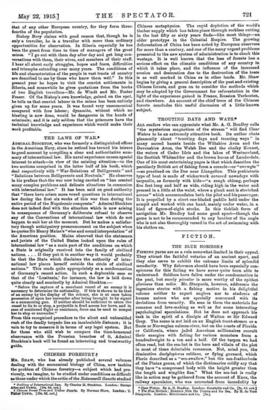AN ENGLISH BISHOP IN RUSSIA.*
IF the first condition of a good book of travels is that the traveller should thoroughly like the people and the country which he is describing, Russian Life To-day has this merit in an eminent degree. Bishop Bury is a lover of Russia at all points: its scenery, its railways, its passport system, its Government—so far at least as it is represented by the Emperor—its peasantry, its clergy, its services, its cities (in winter), its steppes (in summer). His duty, as the Bishop.in- charge of Anglican congregations in Northern Europe, takes him constantly to Russia, and at first he crossed the frontier " with a very quaking and apprehensive spirit." From that moment the process of conversion began. In the course of the first year his "prejudices and preconceptions disappeared one after another with astonishing rapidity," and now his heart warms to this great people as soon as he sees "their kind and friendly faces, their interesting and picturesque houses, and their beautiful churches." Even the language difficulty is not so great as he expected it would be. In only one instance did he find himself compelled to resort to signs to make himself understood. This was on a journey across the Kirghiz steppes to the Spassky copper mines. The management had sent him an interpreter, but his only qualification for the office proved to be that he could speak Russian as well as Kirghiz. This was a journey which might fairly be called off the beaten track, for it began at a town four days and nights east of Moscow. It had to be made in a tarantass, which is a very stout cart lashed upon poles, with a hood like a victoria, and drawn by three horses. "There is no seat inside, but hay is placed over the bottom, and pillows and cushions on the top, and there one reclines during the day and lies down at night." If the description of the journey ended here it might be thought comfortable enough. "But as there were no roads, and only the roughest of tracks with fearful ruts and soft places where water lingers, with sometimes a eloping bank down to a stream," and the horses were always driven at full speed, it is not surprising that for the first day or two the Bishop was near biting his tongue in two from the violence of the jolts. Besides the tinned food they carried with them, eggs, butter, and white bread were to be got in abundance, "and, moat welcome sight, always the steaming samovar, with its promise of cheering and comforting tea." The value of this pre-eminently temperance drink is not lessened, as it often is in England, by over-strength. "It is China tea and light in colour, and as the custom amongst the poorer classes is to put only a moderate quantity of tea into the Echinak, or teapot, to begin with, and to fill up with hot water as they go on • Russian Lift To-day. By the Bight Bev. Herbert Bury, D.D. London Idowbray and 0o. lie. dd, net,] drinking for an indefinite time, it must be very weak indeed at the end." But the few and trifling discomforts of summer travelling on the steppes count for nothing by the side of
its pleasures. The air is invigorating, as is to be expected
at four thousand feet above the sea, streams are flowing everywhere, the ground is covered with flowers, the sky is always blue and cloudless, and the sun shines "brightly but
not too fiercely" throughout the day. Nor are the steppes the solitudes they are sometimes supposed to be. Daring the
short summer caravans carrying tea from China, timber, and other articles of commerce, travellers from town to town, or from one village to another, bands of colonists seeking land upon which to settle, or herdsmen in charge of sheep, oxen, or horses, are continually met. Night and day the Bishop never passed a dull moment, and even when he had just changed horses and saw a fresh driver standing up on the box, whirling his whip, shrieking, yelling, and whistling like a demon, and making the duet and earth fly in all directions, he only felt that it was good to be alive, There is another side to the picture, however, and one which is visible, unfortunately, for more than half the year. For five months Siberia has "the glow and charm of the tropics, with growth and upspringing life and beauty on every hand." Bat for the remaining seven Siberia "is the old Siberia still, fast bound in the grip of an appalling frost, waging in its storms a never-ceasing battle against human enterprise and effort," and still ravaged by wolves of extra- ordinary fierceness. It would be interesting if Bishop Bury could make one of his journeys at this season and tell us something of the life led by the immigrants who in increasing numbers are making Siberia their home.
We may gain some knowledge, however, on this point from what he says of the Russian peasants generally. Nature has made Russia two distinct countries. The agricultural life belongs to the summer. In the winter all outdoor occupa. tions cease, and the peasant's chief business is to obtain the warmth that he must have or die. It is really a case of the survival of the fittest, for over six hundred out of every thousand die before they are five years old. Of those that live, "the men are of huge stature, and their wives are strong, comely, and wholesome looking also. Their boys and girls are sturdy, vigorous, and full of life; and yet how bare the table looks at the daily meal, how frugal the fare and how small the quantity.... Black rye bread and cabbage soup form the staple food of a peasant family, while meat of any kind is rarely seen." The chief institution of Russian peasant life is the weekly bath, taken sometimes at a public bath and some- times in the home. It is usually a Turkish bath—of a sort. A single stove heats several large stones placed above it, and when a bucket of water is thrown on them the place is filled with steam, in which the bather lies and gives himself a liberal ration of soap. One of the earliest arrivals at the Russian front in the present war was a bath train "so completely furnished and arranged that 2,000 men could have a clean bath during the day and 12,000 in the course of the week." The houses of the peasantry are well suited for either extreme of temperature. The log walls are very thick, and the interstices are plastered up with moss and clay. There is usually, besides an inner entrance, one large living-room with a very large stove of whitewashed brick. On the top of this runs a wide shelf long enough to provide sleeping space for the whole family. In a corner is an ikon with a lamp and a shelf for flowers. Here during the long winter, when no outdoor work is possible except the cutting and stacking of wood, the home industries of the peasantry are carried on. Here are made the drawn threadwork and embroidery on linen or hand-woven cloth; the hand-woven laces and the Orenburg shawls which, though they are warmer than Shetland wool, can be drawn through a wedding-ring ; and the toys and painted boxes. Here too the stones and gems are cut, and furs dressed. A peasantry which turns to so many kinds of work is not without an education of its own, even though only twenty per cent, of its number can read or write. But perhaps the most distinctive thing about the Russian peasants is that they are not quarrelsome when they are drunk. On the contrary, "they seem to become more and more affec- tionate, until they begin to kiss each other, and may be seen thus embracing and rolling over and over together like terriers in the snow." The character of the peasants is a more important element in the future of Russia than ia
that of any other European country, for they form three- fourths of the population.
Bishop Bury claims with good reason that, though be is only a traveller, he is a traveller with more than ordinary opportunities for observation. In Siberia especially he has been the guest from time to time of managers of the great mines, "I go out with them day after day and get long con- versations with them, their wives, and members of their staff. I hear all about early struggles, hopes and fears, difficulties and triumphs extending over many years. The conditions of life and characteristics of the people in vast tracts of country are described to me by those who know them well." In this present year be hopes to visit the convict settlements in Siberia, and meanwhile he gives quotations from the books of two English travellers—Mr. de Windt and Mr. Foster Fraser. Of the Bishop's own knowledge, gained on the spot, be tells us that convict labour in the mines has been entirely given up for some years. It was found very uneconomical compared with free labour; dynamite, without which no bleating is now done, would be dangerous in the hands of criminals; and it is only seldom that the prisoners have the technical knowledge and experience which would make their work profitable.



































 Previous page
Previous page